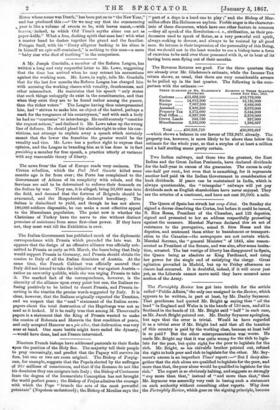Nineteen French bishops have addressed pastorals to their flocks apon
the position of the Holy See. The majority tell their people to pray unceasingly, and predict that the Papacy will survive its foes, but one or two are more original. The Bishop of Perpig- nan, for example, suggests that the Pope is elected by the suffrages of 20J millions of consciences, and that if the Romans do not like his dominion they can emigrate into Italy ; the Bishop of Coutances fears the dogma of the Immaculate Conception has not brought the world perfect peace ; the Bishop of Frejus admires the courage with which the Pope "brands the acts of the most powerful potentate" (Napoleon understood) ; the Bishop of Moulins says the
"part of a dupe is a hard one to play ;" and the Bishop of Mar- seilles offers His Holiness an asylum. Feeble anger is the character- istic of these discourses, which have one other feature in common —they all speak of the Revolution—i. e., civilization, as their pre- decessors used to speak of Satan, as a very powerful evil spirit, always seeking to devour, and always to be resisted by all good men. So intense is their impression of the personality of this Being, that we should not in the least wonder to see a bishop issue a form of exorcism to be said over those possessed with it, or to hear of its having been seen flying out of their mouths.




































 Previous page
Previous page